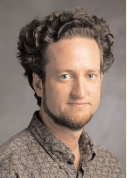CRD’s Brian Tierney Uses Expertise to Improve Performance of Networked Systems
January 1, 2004
A good mechanic doesn’t just keep a car running, but has a toolkit of expertise and expert tricks to get the most performance out of a vehicle. And so it is with networks and computers, especially when distributed computing sources arelinked by networks to perform as an integrated system.

Brian Tierney
Brian Tierney of the Distributed Systems Department has built a reputation as an expert in finding new ways to improve the performance of distributed systems. He’s shared his talents with DARPA, Internet2, CERN and other national labs.
Next up on his agenda is PFDLnet, the Second International Workshop on Protocols for Long- Distance Networks (http://www- didc.lbl.gov/PFLDnet2004/index.htm), which Brian is co-chairing with Les Cottrell of SLAC on February 16-17. At the heart of the workshop is a known problem and four potential solutions.
The problem is with TCP, the transmission control protocol that ensures that data packets are delivered as sent. While TCP is one of the key elements of the Internet’s initial success, it’s now become a speedbump. TCP just doesn’t scale well to work on really fast, long-distance networks – high bandwidth and high latency overwhelm the congestion control algorithm in the protocol. A number of techniques have been developed to deal with the problem, and Tierney himself has created a Web page with 100 tips and tricks for tuning TCP to improve performance (go to http://www-didc.lbl.gov/TCP-tuning/TCP- tuning.html).
“When trying to do Grid troubleshooting, one of the first things people do is blame the net- work – and that’s true less than half the time,” Tierney said. “You can tune the network in terms of TCP, but we’ve exhausted the limits of tuning. For very high-speed networks, a new protocol is really needed.”
The goal of the workshop is to try to come up with a consensus on how to proceed. On the agenda are four approaches, ranging from minor tweaks of the current TCP to a complete overhaul. The tactics range from enhancing the current TCP congestion response algorithms, congestion avoidance- based techniques, building reliability on top of UDP (User Datagram Protocol, or the Unreliable Data Protocol, depending on your perspective) to radically new protocols such as XCP (eXplict control protocol) which requires router support so that the routers inform the sender of the level of congestion at the bottle neck, allowing the sender to back off before congestion (loss) occurs.
While 18 papers will be presented over the two days of the workshop, there will also be plenty of time for discussion, which Tierney said is critical to the success of the workshop.
Tierney stepped forward to co-chair this workshop after attending the first one, and he decided that it was important for the community. “It’s very appropriate that DOE take a leadership role in this work as we have the big applications, and the Science Grid, that TCP is now getting in the way of,” he said.
Contact Brian at BLTierney@lbl.gov.
About Computing Sciences at Berkeley Lab
High performance computing plays a critical role in scientific discovery. Researchers increasingly rely on advances in computer science, mathematics, computational science, data science, and large-scale computing and networking to increase our understanding of ourselves, our planet, and our universe. Berkeley Lab’s Computing Sciences Area researches, develops, and deploys new foundations, tools, and technologies to meet these needs and to advance research across a broad range of scientific disciplines.







 Instagram
Instagram YouTube
YouTube